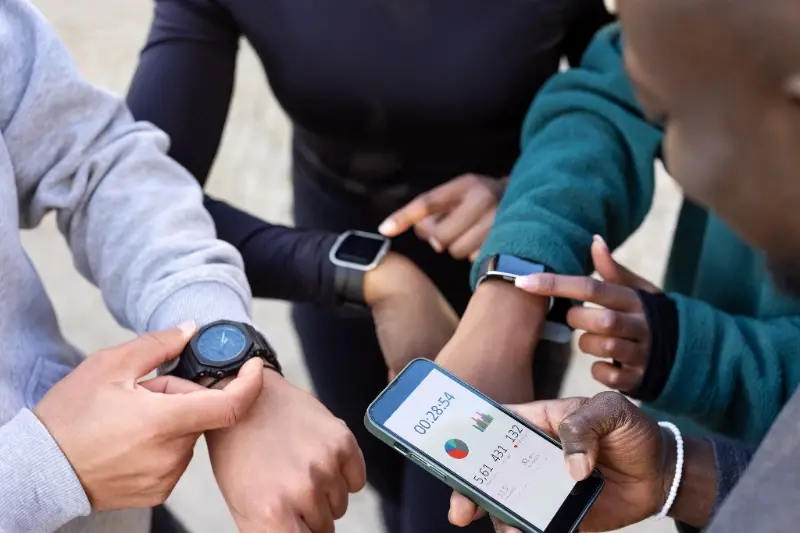Building Your Dream Development Team: Skills Matrix and Hiring Strategy
Building the right development team can make or break your mobile app project. I've worked with hundreds of teams over the years, and the difference between a well-structured team and a poorly assembled one is night and day. Getting your team composition wrong doesn't just slow things down—it can derail your entire project and burn through your budget faster than you'd expect.
The mobile app industry moves at breakneck speed. New frameworks emerge, user expectations shift, and what worked last year might be completely outdated today. That's why having a solid hiring strategy isn't just about finding people who can code; it's about building a team that can adapt, collaborate, and deliver quality work under pressure. Too many companies rush into recruitment without understanding what roles they actually need or what skills matter most for their specific project.
A great developer recruitment process isn't about finding the most talented individuals—it's about finding the right people who work well together and complement each other's strengths
Whether you're a startup building your first mobile app or an established company expanding your development capabilities, the principles remain the same. You need clarity on roles, a structured approach to evaluating skills, and strategies that help you compete for top talent in a competitive market. This guide will walk you through creating a comprehensive skills matrix, developing smart hiring strategies, and building a team culture that keeps great developers engaged and productive.
Understanding Your Team's Core Roles
Building a mobile app isn't a one-person job—despite what those late-night coding sessions might make you think! You need different people with different skills, and understanding what each person brings to the table is the first step to building something great.
Let me break down the key players you'll need on your development team. Each role serves a specific purpose, and missing any of them can leave gaps that'll come back to bite you later.
The Essential Team Members
- Product Manager - The person who keeps everyone focused on what matters and makes sure the app solves real problems
- UI/UX Designer - Creates the look and feel of your app; they make sure users actually enjoy using it
- Mobile Developer - Writes the code that makes your app work on phones and tablets
- Backend Developer - Builds the server-side systems that power your app behind the scenes
- Quality Assurance Tester - Finds bugs and issues before your users do (trust me, they will find them!)
- DevOps Engineer - Handles deployment and keeps your app running smoothly in production
Now, you might be thinking "that's a lot of people for one app!" And you're right. Smaller projects don't always need every single role—some team members can wear multiple hats, particularly in the early stages. A full-stack developer might handle both mobile and backend work, or your designer might also do some basic testing.
The key is understanding what skills you absolutely cannot do without for your specific project. A simple utility app needs different expertise than a complex social platform with real-time messaging.
Creating an Effective Skills Matrix
Right, so you've mapped out your core roles—now comes the fun part of figuring out exactly what skills each person needs. A skills matrix isn't just a fancy spreadsheet; it's your roadmap for building a mobile app development team that actually works together properly.
Think of your skills matrix as a blueprint that shows not just what each role does, but how good they need to be at it. You wouldn't expect your UI designer to be a database expert, but they should understand how their designs connect to the backend systems. This is where many hiring strategies fall apart—people hire in isolation without considering how skills overlap and complement each other.
Technical Skills vs Soft Skills
When building your matrix, you need both technical abilities and people skills. Your lead developer might be brilliant at coding, but if they can't explain technical concepts to non-technical stakeholders, you'll have problems. Here's what to include:
- Core technical competencies for each role
- Level of expertise needed (beginner, intermediate, expert)
- Communication and collaboration skills
- Problem-solving approaches
- Learning adaptability—mobile tech changes fast
Skill Levels That Make Sense
Don't make the mistake of demanding expert-level everything. A junior developer who's eager to learn often brings fresh perspectives that seasoned developers might miss. Map out what's absolutely non-negotiable versus what can be developed over time.
Rate skills on a simple 1-5 scale where 3 is "can do the job independently" and 5 is "can teach others". This helps you spot where you need senior people versus where you can develop talent internally.
Your skills matrix should evolve as your project grows. What you need for an MVP is different from what you'll need when scaling to millions of users—plan for both stages in your developer recruitment process.
Smart Hiring Strategies for Mobile Development
Right, so you know what roles you need and you've mapped out the skills—now comes the tricky bit. Finding the right people isn't just about posting a job advert and hoping for the best. Mobile development talent is competitive, and the good developers usually aren't actively looking for work.
Start with your network before you go anywhere else. I can't tell you how many brilliant developers I've found through referrals from existing team members or industry contacts. People who are already doing great work tend to know other people doing great work—it's just how it works. Offer referral bonuses to your current team; they'll be more invested in finding someone who actually fits.
Look Beyond the CV
Here's what I've learnt over the years: technical skills can be taught, but attitude and problem-solving ability can't. When you're interviewing, spend less time on theoretical questions and more time understanding how they approach real problems. Ask them to walk you through a project they're proud of—not just what they built, but why they made certain decisions.
Don't get hung up on whether someone has used your exact tech stack. A good iOS developer can learn Android, and a React Native developer can pick up Flutter. What matters is their fundamental understanding of mobile development principles and their willingness to learn.
Consider Contract-to-Hire
Sometimes the best approach is to start with contract work before making permanent offers. This gives both sides a chance to see if it's actually going to work out—no awkward conversations later about cultural fit or working styles.
Finding the Right Talent for Your Project
Now that you've mapped out your skills matrix and planned your hiring strategy, it's time to actually find these talented people. This is where things get interesting—and sometimes frustrating. The mobile app development market is competitive, and the best developers often have multiple job offers on the table.
Start with your network first. Reach out to colleagues, former team members, and industry contacts. Personal recommendations carry serious weight in this field because technical skills are only half the story; you need people who can work well with others and understand your project's goals.
Where to Look Beyond Your Network
When networking isn't enough, cast a wider net. GitHub is brilliant for seeing actual code quality—don't just look at repositories, check how developers contribute to open-source projects and interact with the community. Stack Overflow profiles can reveal problem-solving approaches and communication skills.
Specialist job boards like AngelList for startups or Toptal for freelancers often yield better results than general platforms. LinkedIn remains useful, but you'll need to be specific about mobile app requirements in your searches.
The best mobile developers aren't just coding experts—they understand user experience, platform guidelines, and business objectives equally well
Testing Technical and Cultural Fit
Once you've found potential candidates, your evaluation process becomes critical. Technical interviews should include practical coding challenges relevant to mobile development—not abstract computer science puzzles. Ask candidates to walk through their previous mobile projects and explain architectural decisions they made.
Cultural fit matters just as much. Mobile app projects move fast and require constant collaboration between designers, developers, and stakeholders. Someone might be technically brilliant but struggle in your team environment, which ultimately hurts the project more than helps it.
Building a Collaborative Team Culture
Getting talented developers in the door is only half the battle—keeping them working well together is where the real magic happens. I've seen brilliant teams fall apart because nobody thought about how they'd actually collaborate day-to-day. It's not just about having the right skills; it's about creating an environment where those skills can flourish together.
The foundation of good collaboration starts with clear communication channels. Your team needs to know who to talk to about what, and when. This means setting up regular check-ins, establishing project management workflows, and making sure everyone understands their role in the bigger picture. Don't assume people will figure it out naturally—they won't.
Building Trust Through Transparency
Trust builds when team members understand what everyone else is doing and why. Share project timelines openly, discuss challenges as they arise, and celebrate wins together. When developers feel included in the decision-making process, they're more likely to take ownership of their work and support their colleagues.
Creating Psychological Safety
Your team needs to feel safe making mistakes and asking questions. Mobile development is complex, and even experienced developers encounter problems they've never seen before. If people are afraid to admit they're stuck, problems get buried until they become disasters.
Encourage code reviews that focus on learning rather than criticism. Set up mentoring relationships between senior and junior developers. Create space for experimentation—some of the best solutions come from trying things that might not work.
- Hold regular retrospectives to discuss what's working and what isn't
- Rotate responsibilities so team members understand different parts of the project
- Invest in team learning through workshops or conference attendance
- Document processes so knowledge doesn't live in just one person's head
Remember, culture isn't something you can force—it grows from the daily interactions and decisions your team makes together. Understanding what makes a super successful app development team can help you build those foundations from the start.
Managing Remote and Hybrid Development Teams
The shift towards remote and hybrid work has completely changed how we approach mobile app development teams. What started as a necessity has become the new normal for many agencies—and honestly, it's opened up incredible opportunities for developer recruitment that we never had before.
When you're not limited by geography, your hiring strategy suddenly becomes much more flexible. You can find that brilliant iOS developer in Edinburgh or the React Native specialist in Manchester without worrying about office space or daily commutes. But managing these distributed teams requires a different approach than traditional in-person setups.
Communication Tools and Processes
The backbone of any successful remote development team is clear communication. We've learned that over-communication is better than under-communication when team members are scattered across different locations and time zones. Daily stand-ups become even more important—they're often the only time everyone's together.
Set up overlapping core hours when all team members are available, even if they're in different time zones. This makes collaboration much smoother and prevents development bottlenecks.
Code reviews and project management tools become your best friends in this setup. Everything needs to be documented properly because you can't just tap someone on the shoulder to ask a quick question.
Building Team Cohesion
Remote teams can sometimes feel disconnected from the bigger picture. Regular video calls help—not just for work stuff, but for team building too. Virtual coffee chats and informal check-ins make a real difference in maintaining that collaborative culture we talked about earlier.
- Schedule regular one-to-ones with each team member
- Use project management tools that everyone can access easily
- Create clear documentation for all processes and decisions
- Set up informal communication channels for non-work chat
- Establish clear response time expectations
The key is being intentional about creating connections that would happen naturally in an office environment. Remote work can be incredibly productive for mobile app development, but it requires deliberate effort to keep everyone aligned and engaged. Having the right tools for remote collaboration can make all the difference in maintaining productivity and team cohesion.
Conclusion
Building a strong development team isn't something that happens overnight—and that's perfectly fine. What matters most is having a clear plan and sticking to it. The skills matrix we've talked about will help you spot gaps in your team and make smart hiring decisions; the strategies we've covered will help you find people who actually know what they're doing rather than just talking a good game.
I've seen too many companies rush the hiring process and end up with teams that look good on paper but can't deliver when it counts. Don't make that mistake. Take time to understand what each role really needs, be honest about your project requirements, and don't compromise on the skills that matter most to your success.
The mobile development world moves fast, and your team needs to move with it. That means hiring people who can learn new things, adapt to changes, and work well with others—not just those who tick every box on a technical checklist. Building the right culture from day one will save you headaches later on.
Whether you're managing a local team or coordinating across different time zones, the principles remain the same: clear communication, defined roles, and shared goals. Get these fundamentals right, and you'll have a team that can handle whatever your project throws at them. Your dream development team is out there—now you know how to find them and keep them working together.
Share this
Subscribe To Our Blog
You May Also Like
These Related Stories

7 Critical Questions Before Building Your Mobile App

Wearable Apps vs Mobile Apps: What's the Difference?





